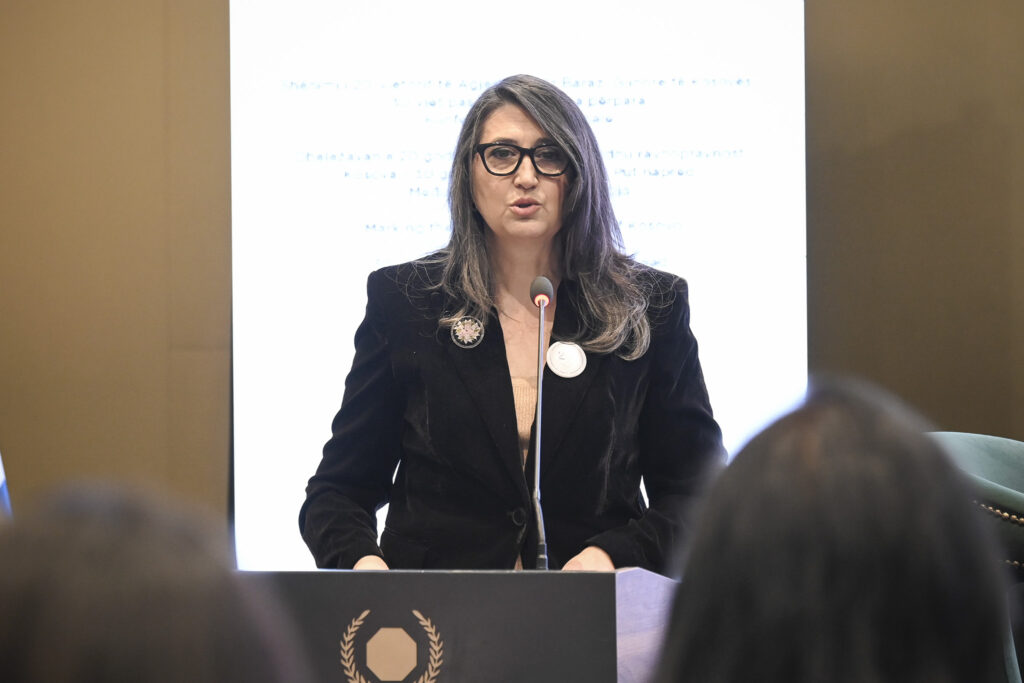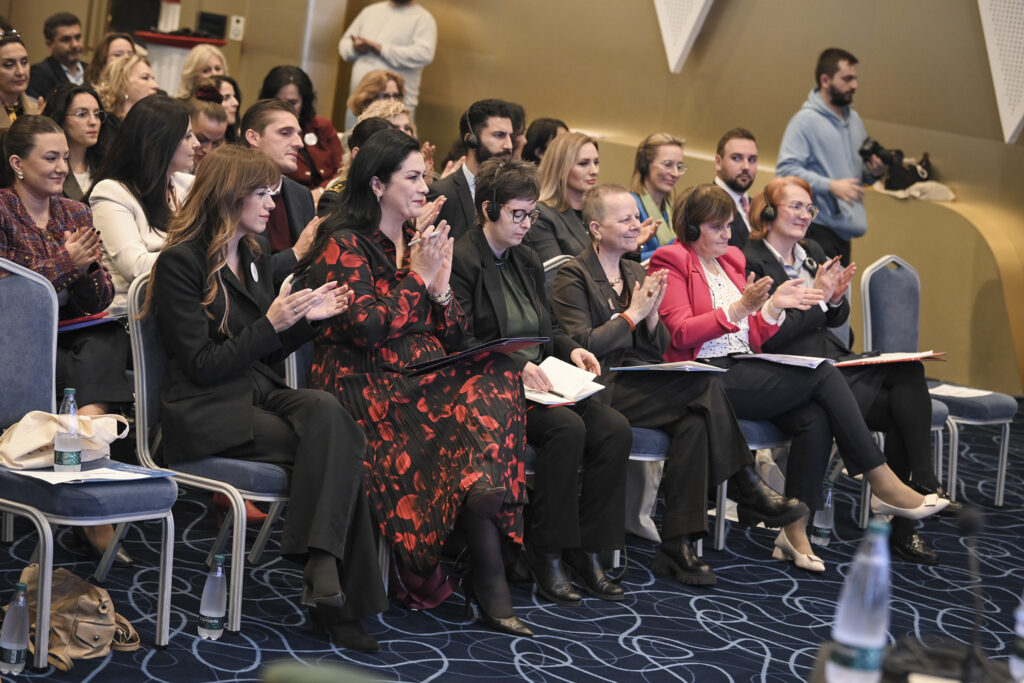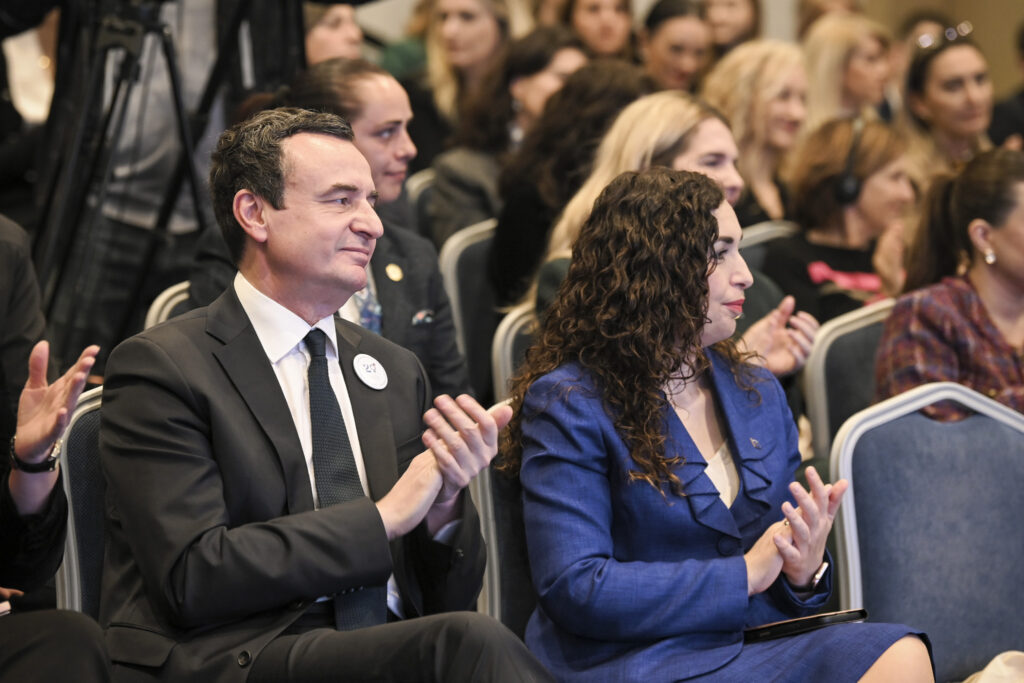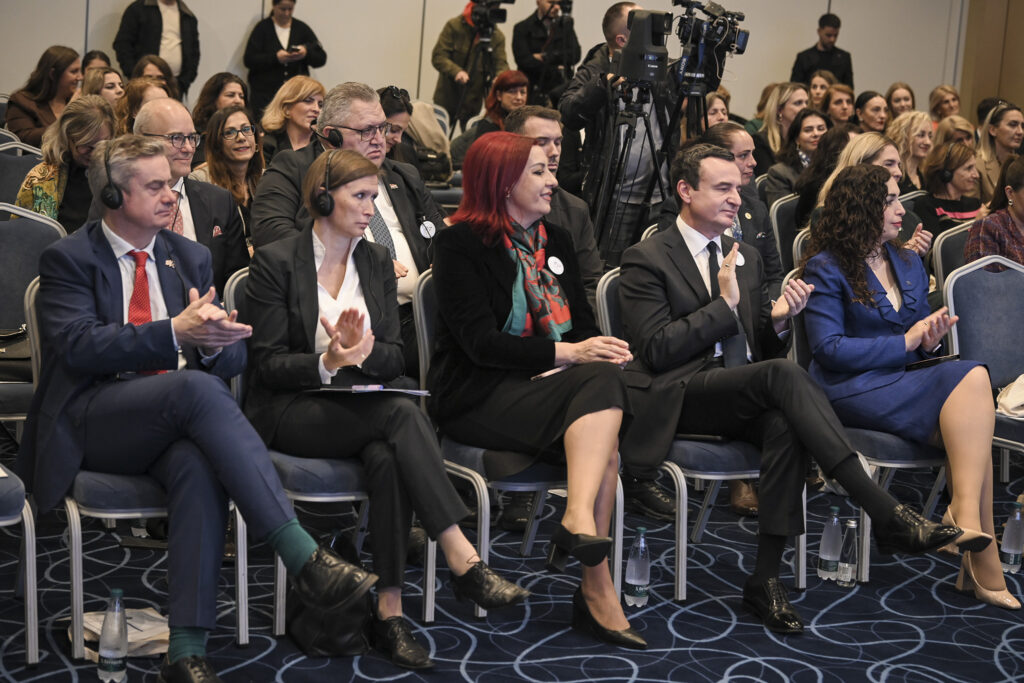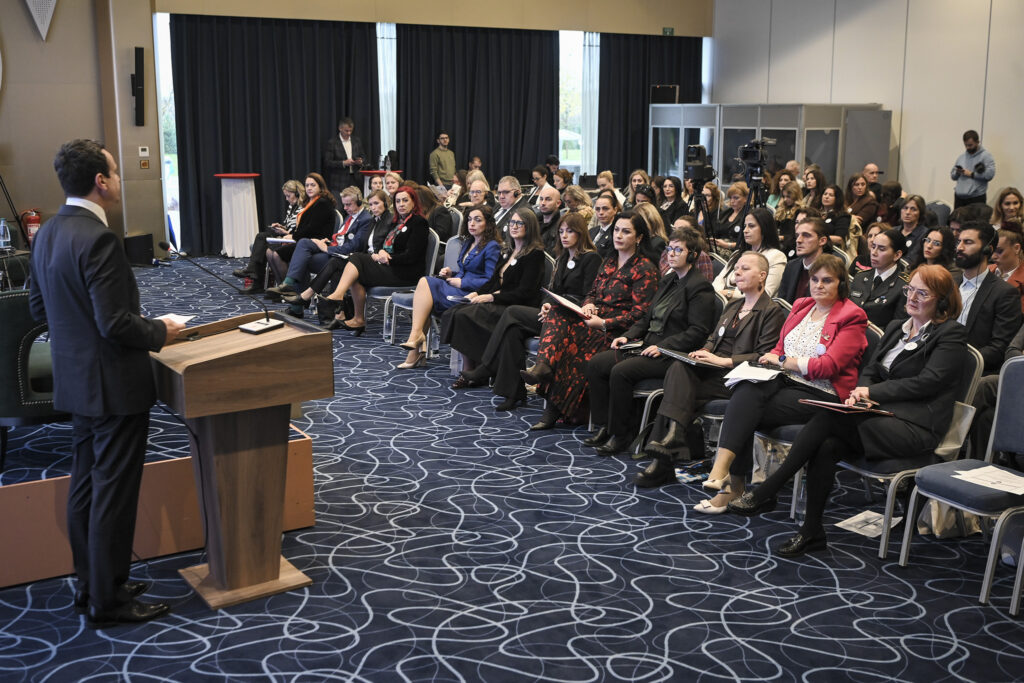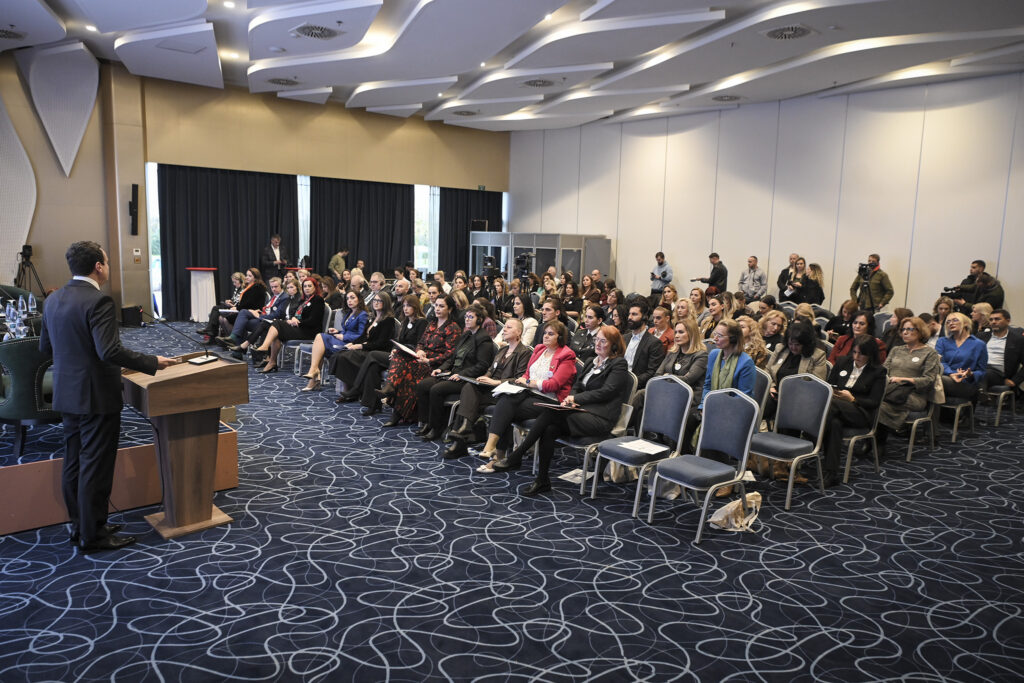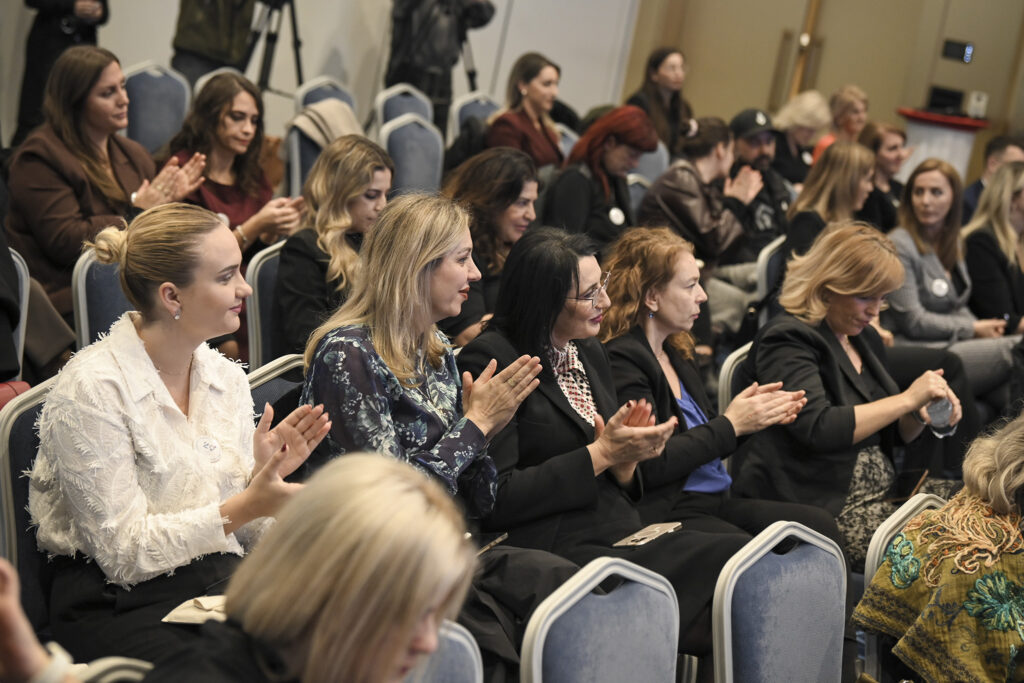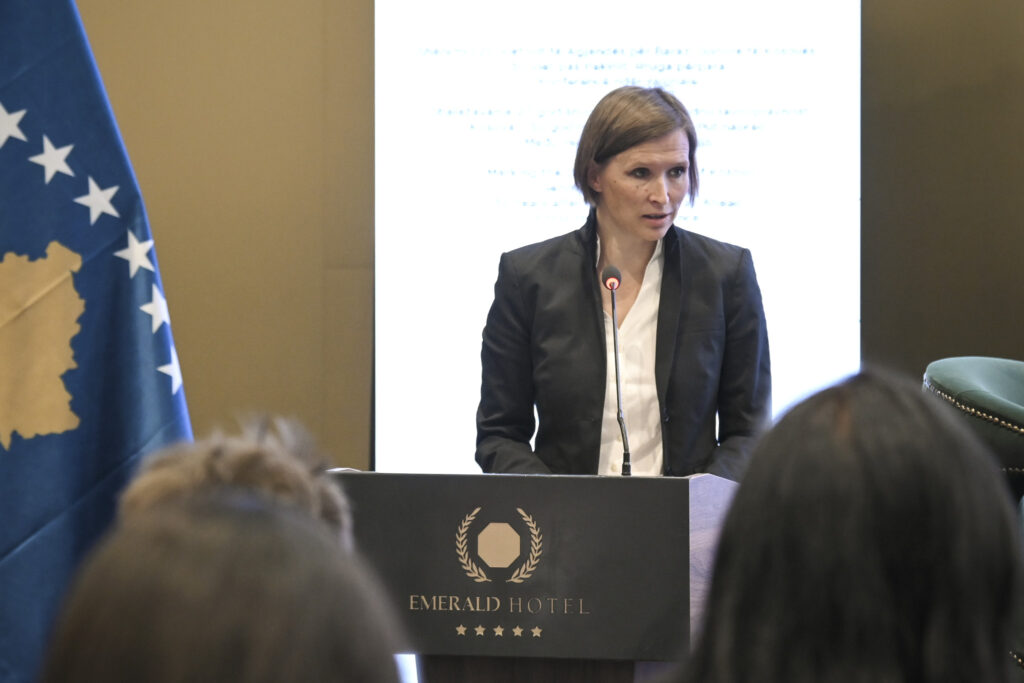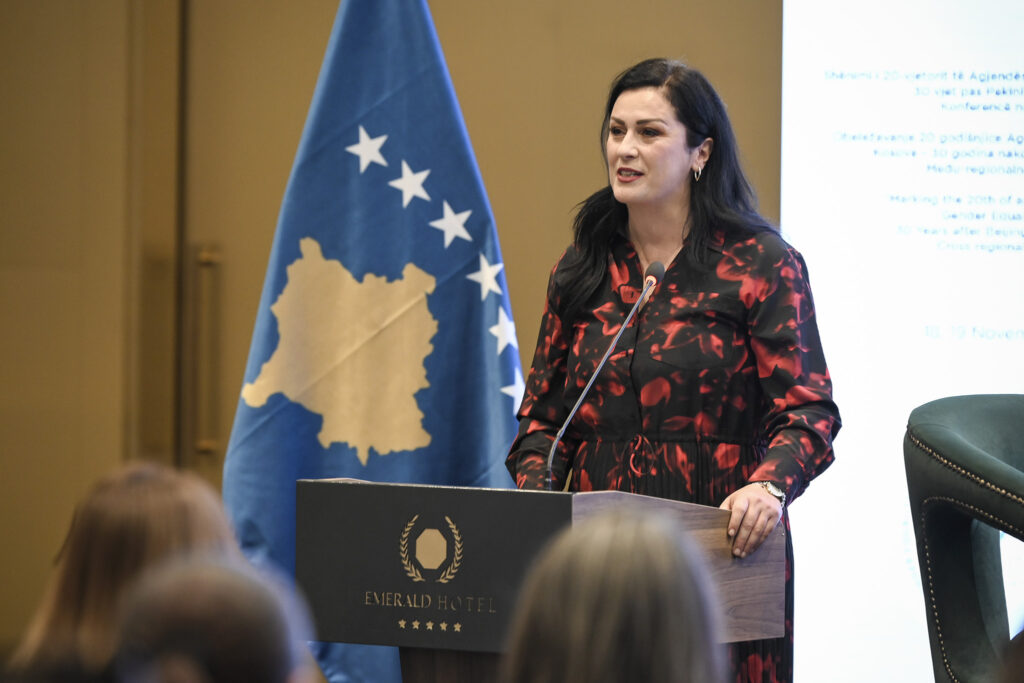Prishtina, 18 November 2025
The Acting Prime Minister of the Republic of Kosovo, Albin Kurti, participated in the event organized to mark the 20th anniversary of the Agency for Gender Equality in Kosovo. At the beginning of his remarks, Prime Minister Kurti said that it is a special pleasure to open this regional conference in a symbolic year that also marks the 30th anniversary of the Beijing Platform and the 25th anniversary of the adoption of Resolution 1325 on Women, Peace and Security.
“As we mark these anniversaries, we reaffirm the commitment of the Republic of Kosovo as an unwavering ally of women’s rights and gender equality. Even though much younger as a Republic, Kosovo has translated the commitments of the Beijing Platform into concrete policies. One of the pillars of this platform is the elimination of women’s poverty, because poverty is not gender-neutral,” said Prime Minister Kurti.
Among the measures taken, he highlighted the employment of over 12,000 women through government programs, the “Superpuna”, “Government for Families”, and “Kosovo Generation Unlimited” platforms, from which the main beneficiaries are women and girls, as well as the fact that around 100,000 women have opened a bank account for the first time in their lives thanks to maternity and child benefits and employment measures for women.
Regarding access to capital and property, the Prime Minister noted that thanks to affirmative measures allowing joint property to be registered in the names of both spouses free of charge, there has been significant progress over the last decade. Specifically, by 2024, there were 17,592 registered properties, compared to only 105 in 2016. This measure has continued this year and the number of properties registered in the names of both spouses has reached 27,830. Thus, in less than nine years, the number of jointly registered properties has increased more than 265 times.
He went on to emphasize that Kosovo is implementing the Beijing Platform, which clearly states that education is essential for women to achieve gender equality. Public higher education has been made free of charge; 15 million euros in direct support have been allocated for students, including nearly 7,000 scholarships for girls and boys in STEM fields—science, technology, engineering and mathematics—of whom 96% are girls; 7,423 elite scholarships have been awarded to students with an average grade of 9.0 or above, including 3,587 girls. Seventy-three new childcare centers have been built; early education has been made mandatory under the Law on Early Childhood Education; and through the voucher program, education costs of up to 150 euros per month for children aged 3–5 from families receiving social assistance are covered.
The Prime Minister also spoke about investments and care for women in healthcare and noted that more justice and security are being provided by addressing violence against women as an issue of human security, in line with the Beijing Platform and Resolution 1325.
“Despite the progress we have achieved as a state and society, challenges to gender equality remain present and require our unwavering commitment, and we remain attentive and dedicated. Amid political pressures and polarization, the Republic of Kosovo is not relativizing gender equality. On the contrary, it is treating it as central both to its democratic project and to the value of social equality,” Prime Minister Kurti concluded.
Full Speech of Prime Minister Kurti:
Honorable Ms. Vjosa Osmani-Sadriu, President of the Republic of Kosovo,
Honorable Ms. Albulena Haxhiu and Ms. Emilija Rexhepi, Deputy Speakers of the Assembly of the Republic,
Honorable Ms. Eva Palatova, Deputy Director of the European Union Office,
Honorable Ambassador of the United Kingdom, Jonathan Hargreaves,
Honorable Ms. Vlora Nushi, Head of the UN Women Office in Kosovo,
Honorable Ms. Luljeta Demolli, Executive Director of the Kosovo Center for Gender Studies,
Honorable Ms. Edi Gusia, Executive Director of the Agency for Gender Equality,
Honored representatives of institutions from the country and the region,
Honored representatives of women’s civil society organizations,
Honored international partners,
Distinguished guests,
Ladies and gentlemen,
Good morning and welcome to Prishtina. It is a particular pleasure to open this regional conference marking the 20th anniversary of Kosovo’s Agency for Gender Equality, in a symbolic year: 30 years since the Beijing Platform and 25 years since the adoption of Resolution 1325 on Women, Peace and Security. Two cornerstones of the world we seek to build—one that is fairer, safer, and more equal for women and girls.
Today, here in Prishtina, as we mark these anniversaries, we reaffirm the commitment of the Republic of Kosovo as an unwavering ally of women’s rights and gender equality.
Distinguished participants,
Although a much younger Republic, Kosovo has translated the commitments of the Beijing Platform into concrete policies. One of the pillars of this platform is the elimination of women’s poverty, because poverty is not gender-neutral. Therefore, as a government, we have undertaken measures that break this cycle:
• More than 12,000 women have been directly employed through our employment programs.
• On the “Superpuna” platform, of nearly 20,000 young participants, 51% are women and girls. Meanwhile, we are working on the dedicated platform “Superpuna for Women,” through which women employed in the private sector will receive the minimum wage—425 euros as of January 1, and 500 euros as of July 1 next year—as a six-month bonus. Because to move forward successfully, it is essential that gender equality standards be applied in the private sector as well, so that equality becomes practice in every workplace, for every girl and woman. Every institution, every enterprise, and every community must be an ally for gender equality—a society where the potential of women is seen, supported, and valued.
• Of more than 4,000 people employed through the “Government for Families” program—ensuring that no family is left without at least one employed member—55% are women.
• In the “Kosovo Generation Unlimited” program, nearly 60% of beneficiaries are girls and women.
• Around 100,000 women have opened a bank account for the first time in their lives thanks to maternity benefits, child benefits, and employment measures for women.
And when we speak about access to capital and property—one of the major barriers for women—we have seen remarkable progress thanks to affirmative measures allowing joint property to be registered in the names of both spouses free of charge. By 2024, 17,592 such properties were registered, compared to only 105 in 2016. This measure has continued this year, and the number of jointly registered properties has reached 27,830. In less than nine years, the number has increased more than 265 times.
The Beijing Platform clearly states: education is essential for women to achieve gender equality. Therefore, we have made public higher education free of charge at all levels—both bachelor and master—with only doctoral studies requiring payment. More than 173,000 students, girls and boys, have been exempted from tuition fees since 2021.
Fifteen million euros have been allocated as direct support for students, including 6,917 scholarships for girls and boys in STEM fields—science, technology, engineering, and mathematics—of whom 96% are girls; and 7,423 elite scholarships for students with a GPA of 9.0 or above, including 3,587 girls.
Seventy-three new childcare centers have been built or are under construction across the country, because without quality childcare, women remain inside the home and outside the labor market. Thanks to new childcare facilities in certain areas, women now have the opportunity to return to the labor market—which many left after giving birth—or to enroll in higher education or continue studies they had paused for the same reason.
Early childhood education has been made compulsory through the Law on Early Childhood Education, and the new curriculum is being piloted. Through the voucher program, education costs of up to 150 euros per month are covered for children aged 3–5 from families receiving social assistance, enabling their inclusion in early education while giving mothers the opportunity to pursue education, employment, and self-employment.
Kosovo has increased its healthcare budget—by more than 130 million euros compared to the pre-pandemic year, an increase of 57%—with a significant portion directed toward women’s health and healthcare services, including:
• Free mammography throughout the entire year;
• Free breast reconstruction for women with cancer;
• Thanks to new diagnostic equipment and awareness campaigns, most breast cancer cases that were previously detected at stages 3 and 4 are now diagnosed at stages 1 and 2;
• HPV vaccination for girls up to age 15, to prevent cervical cancer;
• Three new MRI machines and the transformation of key clinics, including Gynecology and Oncology;
• New services such as Fetal Medicine and amniocentesis;
• More than 70 new medicines added to the essential medicines list, including those for Assisted Fertilization.
Distinguished participants,
At a time when many countries around the world are witnessing restrictions on reproductive rights, stigmatization, and obstacles to access, Kosovo is expanding both access and quality.
In line with the Beijing Platform and Resolution 1325, we are addressing violence against women as a matter of human security—not a private issue.
• We have adopted the National Strategy for Protection from Domestic Violence and Violence against Women 2022–2026, with 94% of activities implemented or under implementation.
• We have launched the State Protocol for the Treatment of Sexual Assault Cases.
• We provide free legal aid to victims of domestic and gender-based violence, regardless of their economic status.
• We adopted the Law on Compensation of Crime Victims, because justice does not end with punishing the perpetrator—compensating the victims is essential.
• 7.3 million euros have been allocated in financial support for shelters and licensed NGOs in social and family services for the period 2021–2025.
• We launched the employment measure for women victims of violence, where the state subsidizes 70% of the salary for six months. Reintegration of victims is extremely important, and dignified and well-conditioned employment is a key factor for that reintegration.
Kosovo embodies the essence of the Women, Peace and Security Resolution—not only because of our history but also because of the women of this country.
Women peace activists, women’s organizations, survivors of war-related sexual violence, women in the Kosovo Security Force and Kosovo Police who today hold high ranks—all are examples of its implementation. Specifically:
• 411 women and girls serve in the KSF, including a Major General, Colonels, Lieutenant Colonels, and hundreds of non-commissioned officers and soldiers.
• 1,504 women serve in the Kosovo Police, dozens of whom hold leadership positions and serve in specialized units such as the Special Intervention Unit and special operations, as well as border patrols.
At a time when wars, conflicts, and authoritarianisms are unfortunately increasing—where women are often the first to be affected and the last to be heard—Kosovo reaffirms that women must not be seen solely as victims of war, but as actors and agents of peace and security.
The Republic of Kosovo continues to move forward, despite the global wave of regression in equality, where women’s and girls’ rights are being openly contested in many countries. Despite the progress we have achieved as a state and society, challenges to gender equality persist and require our unwavering commitment—and we remain attentive and dedicated. Amid political pressure and polarization, the Republic of Kosovo is not relativizing gender equality. On the contrary, it is treating it as central both to its democratic project and to the value of social equality.
Distinguished participants,
I hope that today’s conference serves as a platform for cooperation and that we emerge with recommendations that then translate into concrete policies.
Thank you for your attention and participation, and I wish you fruitful discussions throughout the conference.
